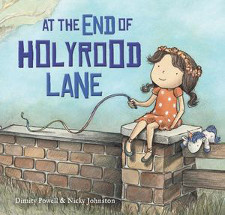At the end of Holyrood Lane by Dimity Powell

Ill. by Nicky Johnston. EK Books, 2018. ISBN 9781925335767
Flick lives at the End of Holyrood Lane in a little house beneath
the beech woods, spending most of her days in the sunshine dancing
with the butterflies and playing with her unicorn toy and long,
rainbow ribbon. But sometimes a storm hits - storms so violent and
loud and scary that she has to hide because even her rainbow ribbon
and her unicorn cannot give her comfort. She is very good at hiding
but the storms make her feel very small and they are so loud her
ears hurt and her heart throbs.
; One day, the storm is so fearsome and last so long that there is
nowhere for Flick to hide and so she flees. But it follows her,
almost swallowing her in its fury, until "sodden and shaken" she
stops, gathers all her courage and asks for help. She is gathered
into the arms of someone with a large umbrella and even though it
rumbles and grumbles for a while, finally the storm leaves. And the
sun comes out.
Flick is still scared of storms and flinches if the rumbling starts,
but while it might rain a bit the storms have gone for good.
While a fear of thunderstorms is common for many children, and even
telling them it's just the clouds bashing together doesn't soothe,
in this case the thunderstorm is a clever metaphor for what is
happening in the house under the beech trees. Dimity Powell and
Nicky Johnson, the couple behind the poignant story of The Fix-It
Man, have teamed up again to bring us a book that uses the analogy
of weather to explore the issue of domestic violence and its impact
on the children in the family who are so often invisible as the
storm's fury strikes, often without warning. Sadly, this is an
all-too common happening in the lives of those in our care but so
rarely touched on in children's literature, particularly picture
books for the young. While we often hear the phrase that school is a
"safe haven" for many children, there is much that goes on beyond
school hours that we are not privy to, and unless a situation
directly impacts a child in the class such as being removed into
foster care, we really do not know the extent of the problem or the
damage it causes.
Sharing At the End of Holyrood Lane as a class story may
offer an opportunity to allow children to discuss those things they
are scared of, their own personal "storms" and perhaps Flick's
courage in asking for help might inspire another little one to
disclose something that will bring them respite too. Children need
to know they are not alone and it's OK to ask for help - that there
is hope for the sun to shine again and there will be a chance to
dance with the butterflies.
With its soft, supportive illustrations that encapsulate and extend
the sensitive, subtle text superbly, and endorsed by a number of
agencies concerned about the children caught in the middle of
domestic violence such as Act
for Kids, RizeUp, Paradise
Kids, and Think Equal,
this is a conversation starter that may bring a lot of comfort, help
and hope to the children in our care.
Barbara Braxton